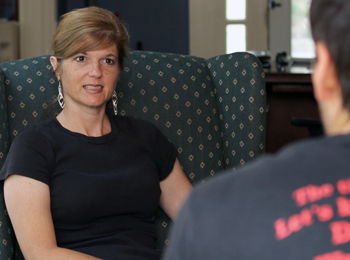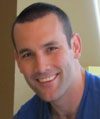Changes in the Medical College Admissions Test (MCAT) will soon reflect the power and desirability of a liberal arts education.
The new MCAT test, taken by all pre-med students for medical school acceptance, will place a new emphasis on an understanding of how socio cultural factors affect health. The new test includes two sections on life sciences, a section on behavioral and social sciences and a section on critical analysis and reasoning. The new test will be in place by 2015.
 “I’ve advised dozens of Wabash men in their journey to medical school. Without question, scoring well on the MCAT exam is their biggest concern,” said Jill Rogers, Admissions Counselor and Pre-Med Advisor. “The test is designed to assess a student’s problem solving and critical thinking skills, and to evaluate their knowledge of science concepts necessary for the study of medicine. But as the study of medicine evolves so must the MCAT.
“I’ve advised dozens of Wabash men in their journey to medical school. Without question, scoring well on the MCAT exam is their biggest concern,” said Jill Rogers, Admissions Counselor and Pre-Med Advisor. “The test is designed to assess a student’s problem solving and critical thinking skills, and to evaluate their knowledge of science concepts necessary for the study of medicine. But as the study of medicine evolves so must the MCAT.
“Today’s doctors not only need to understand medical science, but they need to appreciate diverse and aging populations. They need to value the role social and behavioral qualities play in treating and healing, and work in a healthcare delivery system that is in flux.”
Darrell Kirch, president and CEO of the medical colleges association, which administers the MCAT said more diverse physicians are needed. “The signal we are trying to send is while medical school requires this solid grounding in the life sciences, it also requires a broader, more humanistic, social-oriented perspective.”
"I find these changes rather interesting and long overdue," Dr. Kris Gunn ’02 said. Gunn is a general surgeon at Barnes Jewish Hospital, St. Louis. “What does this really mean? Simply that the AAMC and medical school administrators have finally realized what most of us have known since we started our residency: your MCAT score and where you went to medical school doesn't really matter. Critical thinking, analytical skills, perseverance and creativity are so important to success, however so poorly assessed by the MCAT and medical school admission teams.”
 Gunn, biology major, said Wabash men should be pleased with the new test. “You will be very well prepared to be the kind of doctors that the medical college admission folks are looking to develop,” he said. “Ten years ago, I thought taking MCAT was a pinnacle life moment. Happily, it is not. Going to Wabash, having children, graduating medical school and then residency... these were the big moments. I promise that in 10 years you may even forget what your MCAT score was, but you'll remember every second of your Senior Comps."
Gunn, biology major, said Wabash men should be pleased with the new test. “You will be very well prepared to be the kind of doctors that the medical college admission folks are looking to develop,” he said. “Ten years ago, I thought taking MCAT was a pinnacle life moment. Happily, it is not. Going to Wabash, having children, graduating medical school and then residency... these were the big moments. I promise that in 10 years you may even forget what your MCAT score was, but you'll remember every second of your Senior Comps."
Wassim Labaki ’08 just completed medical school at Georgetown University and is about to start a residency at John Hopkins. Labaki, also biology major, said the change was long overdue. He noted the importance of understanding the natural sciences remains a key, but that it’s not enough to become a good doctor.
“A thorough understanding of the social, cultural, economic and behavioral aspects of medicine is becoming increasingly important to take good care of patients,” Labaki said. “This is particularly true today when the patient population in the US is more diverse than ever and when regular access to care has become a challenge for many.
.jpg) “As a senior medical student, I cannot emphasize enough the importance of critical thinking in learning and applying the vast amount of medical knowledge. Patients often come to the ER or to clinic with non-specific symptoms. Furthermore, many diseases and conditions can present in an atypical fashion that might be different from what is described in textbooks. Here is where the physician's analytical reasoning comes into play to rule out life-threatening conditions and build a solid differential diagnosis.’
“As a senior medical student, I cannot emphasize enough the importance of critical thinking in learning and applying the vast amount of medical knowledge. Patients often come to the ER or to clinic with non-specific symptoms. Furthermore, many diseases and conditions can present in an atypical fashion that might be different from what is described in textbooks. Here is where the physician's analytical reasoning comes into play to rule out life-threatening conditions and build a solid differential diagnosis.’
Labaki, a magna cum laude grad, said the critical thinking skills learned at Wabash are ideal for a career in medicine. “The strong and broad liberal arts education I received at Wabash helped me tremendously to overcome the challenges I faced during the pre-clinical and clinical years of medical school.” The Lebanon native said. “My courses at Wabash taught me to never be satisfied of answering only the "what", "where" and "when" questions, but to always probe into the "why", "how" and "what if" scenarios.”
For Rogers, it’s gratifying to watch Wabash men graduate well prepared not just for the new MCAT but to become physicians who can make a difference in society.
“I frequently think to myself, ‘I’m glad I know this man, because some day, if I ever need a [fill in the blank for appropriate specialist], I will know whom to consult,’ she said. “And when I think this, it’s not just because they scored well on their MCAT. It’s because I see in that man leadership, flexibility, and humanistic qualities that I want in my physician. In short, these are men that live up to the Wabash mission statement.”
The MCAT has been updated periodically since its inception in 1928. The new test will take 6.5 hours to complete compared to 4 hours previously. Approximately 75,000 students nationwide took the MCAT last year.